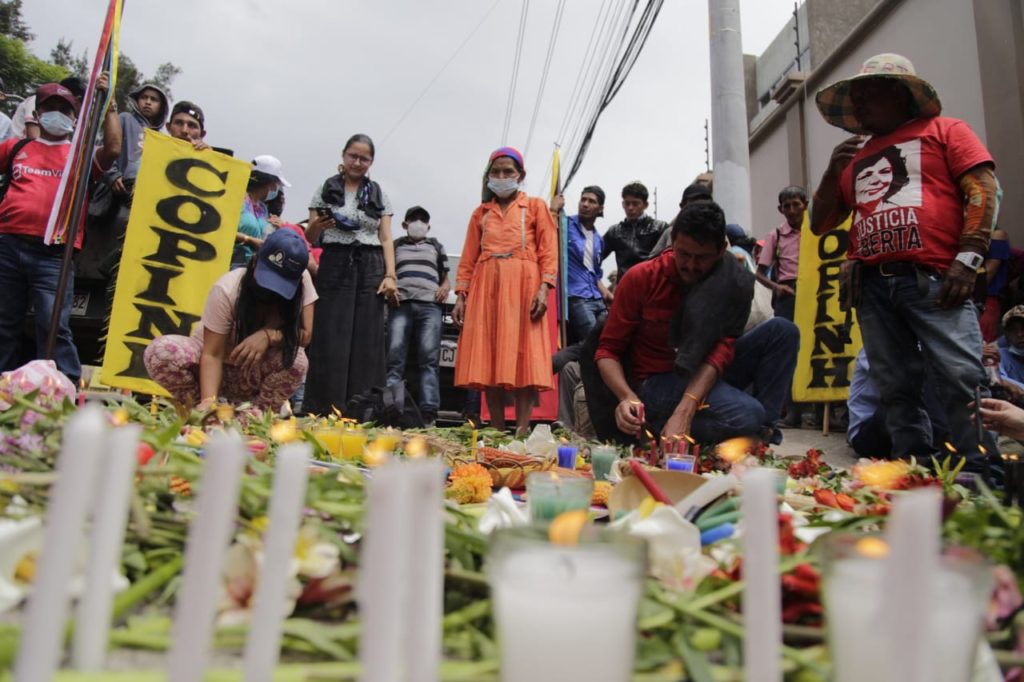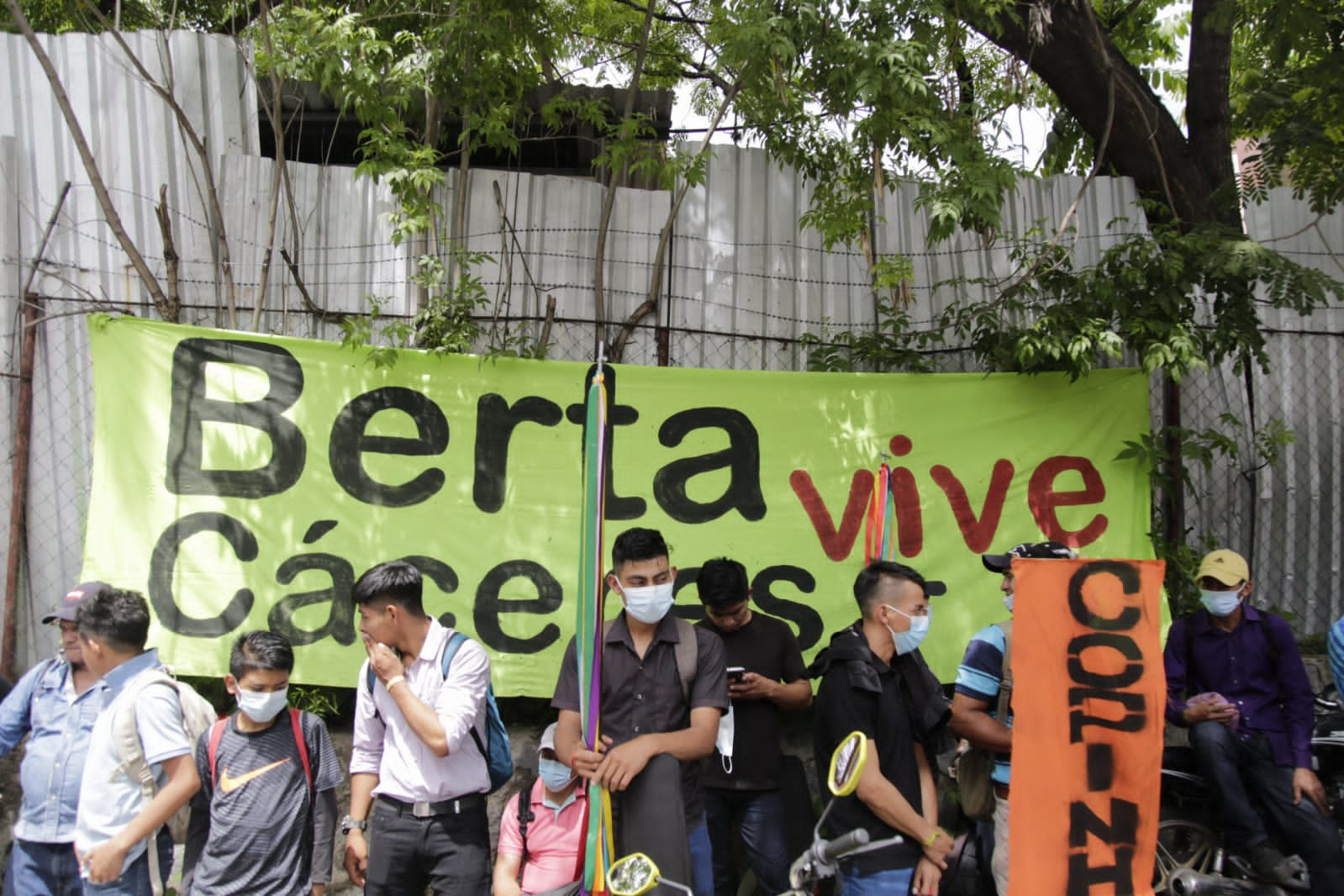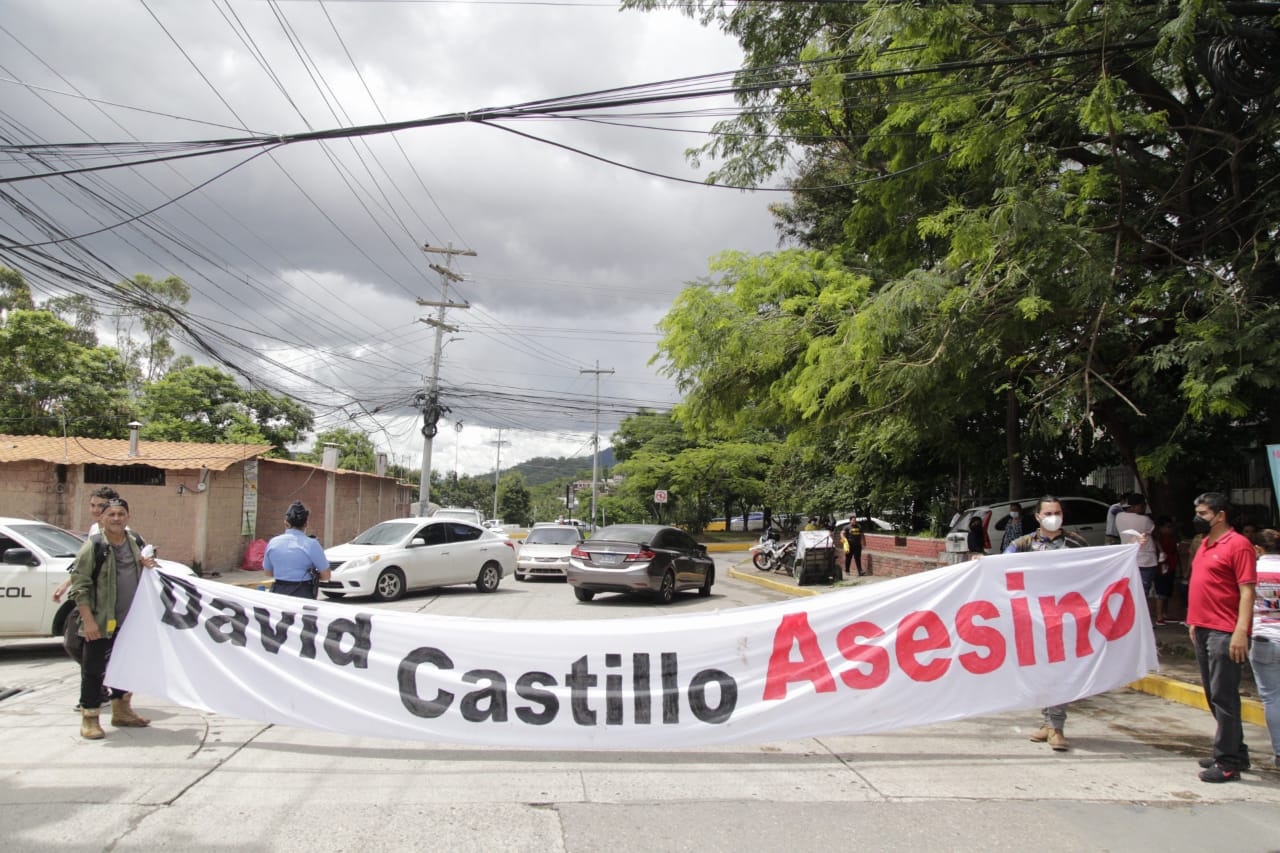David Castillo, the former general manager of energy company DESA, was sentenced to 22 years and six months in prison for being one of the intellectual authors of the murder of indigenous leader and environmentalist Berta Cáceres. Her relatives and colleagues are now demanding that the Atala clan face justice.
By Fernando Silva
Photos by Fernando Destephen
Additional reporting by Celeste Maradiaga
After two trials that resulted in eight convictions, those affected by the murder of Indigenous leader and environmentalist Berta Cáceres have not given up their pursuit of justice. The sentence handed down on June 20 put David Castillo behind bars for 22 years and six months, seven and a half years less than the maximum allowable for murder. David Castillo was found guilty of being one of the intellectual authors of the murder of Berta Cáceres, who gained global recognition for her activism which saw her win the Goldman Environmental Prize.
The day after Castillo was sentenced, members of COPINH (Consejo Cívico de Organizaciones Populares e Indígenas de Honduras), the association of Indigenous organizations founded by Cáceres, marched through the streets of Tegucigalpa demanding the investigation and prosecution of members of the Atala Zablah clan– one of the most powerful family-owned business conglomerates in the country. Several Atala family members served on the board of directors of Desarrollos Energéticos S.A. (DESA), the company behind the Agua Zarca (literally Green Water) hydroelectric project opposed by Cáceres, COPINH, and surrounding communities.
Now led by Berta Zúniga, Cáceres’ daughter, COPINH is also demanding the revocation of the government concession to build a hydroelectric dam on the Gualcarque River. Although construction has been halted, the concession granted by the Ministry of Natural Resources in 2010 is valid for 50 years.
Castillo’s defense team says it will pursue a reduced sentence due to mitigating factors prescribed by the country’s penal code, and describe the trial as having been “manipulated and influenced by international pressure.”
The Atala clan and the trial of David Castillo
In June 2021, DESA’s former financial manager, Daniel Atala Midence, was called to testify in person at the public trial of David Castillo. But he never testified after the Ministry of Justice cited an ongoing investigation of Atala’s involvement in the Cáceres murder.
Read (in Spanish) The murder of Berta Cáceres: a story about money and political power
The Atala clan owns financial institutions, soccer teams, real estate, and other companies; a business empire that has made them one of the wealthiest families in the country. Daniel Atala Midence, Jacobo Atala Zablah, Pedro Atala Zablah, and José Atala Zablah are all prominent family members, and all served on DESA’s board of directors.
Their leadership role in DESA is the reason why COPINH decided to demonstrate in the parking lot of one of the Atala-owned banks after Castillo was sentenced. They pasted posters on the walls with the names and faces of the Atalas, accusing them of complicity in the Cáceres murder. They held up a giant banner that read: “Atalas are murderers — Berta Cáceres lives.”
After Castillo was sentenced, Víctor Fernández, a lawyer who represents the Cáceres family, claimed that Castillo was not the intellectual author of the crime, but rather an intermediary for a much more influential organization; the Atala family.
“This sentence sets a very important precedent,” said Fernandez, “because he is the first businessperson sentenced in Honduras for the murder of a social and environmental leader. David Castillo’s connection to a criminal network was proven by forensic evidence from phone records. He was the instrument of a larger organization that includes the owners of DESA; the Atala Zablah family.”
The Castillo trial and the 2018 trial of the seven perpetrators of the crime both proved that DESA executives coordinated with the hitmen who murdered Cáceres. The seven men convicted of the murder each received sentences of up to 50 years in prison. Elvin Rápalo, Henry Hernández, Edilson Duarte, and Óscar Torres Velásquez were sentenced to 34 years for the Cáceres murder, plus another 16 years for the attempted murder of the person who was with Cáceres at the time.
Mariano Díaz Chávez was found guilty of the criminal omission (failure to prevent) of murder and was sentenced to 30 years. Douglas Geovanny Bustillo, a former military officer, and Sergio Ramón Rodríguez were convicted of being co-perpetrators of the murder and received sentences of 30 years and six months, each.
Read (in Spanish): Despite seven convictions for the murder of Berta Cáceres, justice is still incomplete
Fernández said that justice for the Cáceres murder is still incomplete because “the intellectual authors have not been punished and because a [business] concession that is detrimental to the government and the Lenca people is still valid and needs to be revoked. There are ongoing proceedings against former officials who may have assisted in perpetrating this crime and against the financial institutions that invested in this [dam construction] project knowing that it violated human rights and harmed an indigenous community.”
Berta Zúniga Cáceres, the daughter of the murder victim, said she felt “disappointed” that Castillo was not given the maximum sentence of 30 years, considering that it was a high-impact crime.
“Everyone in the criminal organization involved in this crime should be brought to justice,” said Zúniga, referring to the Atala family. Although the Ministry of Justice has hinted at other investigations in the case, so far there is no specific information or charge, said Zúniga. “Today, our organization undertakes its biggest challenge, which is to go after the intellectual authors of this crime, who have so far gone unpunished,” she said.
Juan Carlos Sánchez, Castillo’s defense attorney, told Contracorriente that his client’s sentence conforms to the law, which stipulates 20-30 years for this crime. “Given the circumstances, he was sentenced to 22 years and six months in prison, so I don’t see any reason from a procedural point of view to apply a different sentence.”
Sánchez said that Castillo’s sentence might be reduced, and noted that he has already served four years in prison while awaiting trial. “This isn’t about freedom [for Castillo], it’s about dignity,” said Sánchez, claiming that in his experience, he has never seen “a process in which so many irregularities and crimes were committed by investigators against a citizen.”
“The sentencing court had a boot on its neck that was held there by international pressure from human rights organizations. You could look at a million human rights organizations and not find a single one that supports David Castillo, because his trial was all about money, politics, and ideology,” said Sánchez.
Regarding the accusations against the Atala family, Sánchez said, “Those poor people have been linked to all this by COPINH leaders who use social media to spread lies, distort the truth, and trick the Lenca people into coming to the city to protest. They are using the Lenca to raise money.”
No member of the Atala clan has spoken out about the Castillo case or about the accusations against them. However, in November 2017, María Luisa Borjas, a retired police commissioner and congressional representative claimed to have a report from the Ministry of Security’s inspector general that allegedly said Camilo Atala and the Atala Zablah family financed the crime. Borjas was charged with defamation and slander against Camilo Atala. She was later convicted and sentenced to 32 months in prison and disqualified from holding elected office.
What can the Castro administration do about the Gualcarque River concession?
In her inaugural speech, President Xiomara Castro called for “justice for Berta Cáceres.” As the final act of the inauguration, Berta Zúniga Cáceres presented the “Lenca Ceremonial Staff” to the new president. This staff is an important element in Lenca cosmology and symbolizes respect and authority. In the months since the inauguration, the Castro administration has pledged its support of COPINH and its cause.
Legislator Jari Dixon, president of the National Congress’ justice and human rights commission, submitted a bill in late May to declare Berta Cáceres a national hero and to put her image on the 200-lempira bill. This “tribute” to Cáceres was furiously debated on social media and Laura Zúniga, one of Berta’s daughters, said, “It would hurt to see my mother’s face on money stored in banks owned by her murderers. Her rebellion would instead represent their wealth. Will they pay for the next murder with 200-lempira bills? After all, they enjoy complete impunity.”
In a flurry of tweets, Laura Zúniga warned, “The Gualcarque River is still under a concession that represents a latent danger for those of us who defend life. The government must resolve this situation.”
Just a few days after Cáceres’ image was approved for the 200-lempira bill, a photo taken after a professional soccer match circulated on social media. It showed Héctor Zelaya, the president’s son and private secretary, Jorge Aldana, mayor of Tegucigalpa and Libre Party member, and Pedro Atala, president of the Motagua soccer club and one of those responsible for the Cáceres murder, according to COPINH.
Libre Party legislator Ramón Barrios said that he doesn’t attach much significance to the photo, though “one must be careful about these things – it’s already in the hands of the executive branch.” As a member of the National Congress’ justice and human rights commission, Barrios said he intends to make a statement about the Castillo sentence.
“This is a landmark case,” said Barrios, “because the intellectual authors [of the crime] belong to the country’s top oligarchy, and I’m worried that they will go unpunished. The government should intervene to ensure their punishment, close down the operation, and revoke the concession for the Agua Zarca dam.”
Based on the Castillo conviction, Barrios intends to submit a request to the Ministry of Justice during a plenary session of the National Congress for the revocation of the concession granted to Agua Zarca.
Human Rights Minister Natalie Roque told Contracorriente that it’s important to heed the Cáceres family’s complaints that Castillo’s sentencing isn’t the end of the story since the intellectual authors of the murder have not been prosecuted.
“The Ministry of Human Rights is concerned and wants answers for the Cáceres family. We know that various experts and the Cáceres family itself have been gathering information for years that has been provided to the Ministry of Justice and that apparently demonstrates that the final chapter in the murder of Berta Cáceres has yet to be written,” said Roque. She said that the government has supported the family by providing protection to ensure their safety in accordance with the provisions of the Inter-American Commission on Human Rights.
One of the mechanisms that indigenous organizations and environmental activists have proposed to prevent crimes like the murder of Cáceres is to establish laws and procedures for free and informed prior consultation. The administration of Juan Orlando Hernández repeatedly blocked similar legislation and prioritized business interests over indigenous rights.
To this end, Roque said, “The Ministry of Human Rights is promoting a renewed inter-institutional effort for legislation on free and informed prior consultation. But the most important thing is to listen and support our indigenous peoples so that they can determine the most appropriate mechanisms for ensuring that free and informed prior consultation becomes a reality in our country.”
Read (in Spanish): Castor Energy: in the aftermath of the Berta Cáceres murder










